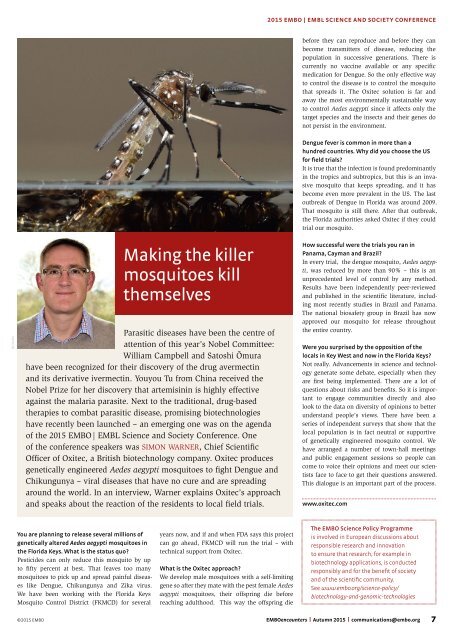Exploring
EMBO_encounters_issue31
EMBO_encounters_issue31
Create successful ePaper yourself
Turn your PDF publications into a flip-book with our unique Google optimized e-Paper software.
2015 EMBO | EMBL Science and Society Conference<br />
before they can reproduce and before they can<br />
become transmitters of disease, reducing the<br />
population in successive generations. There is<br />
currently no vaccine available or any specific<br />
medication for Dengue. So the only effective way<br />
to control the disease is to control the mosquito<br />
that spreads it. The Oxitec solution is far and<br />
away the most environmentally sustainable way<br />
to control Aedes aegypti since it affects only the<br />
target species and the insects and their genes do<br />
not persist in the environment.<br />
Dengue fever is common in more than a<br />
hundred countries. Why did you choose the US<br />
for field trials?<br />
It is true that the infection is found predominantly<br />
in the tropics and subtropics, but this is an invasive<br />
mosquito that keeps spreading, and it has<br />
become even more prevalent in the US. The last<br />
outbreak of Dengue in Florida was around 2009.<br />
That mosquito is still there. After that outbreak,<br />
the Florida authorities asked Oxitec if they could<br />
trial our mosquito.<br />
© Oxitec<br />
Making the killer<br />
mosquitoes kill<br />
themselves<br />
Parasitic diseases have been the centre of<br />
attention of this year’s Nobel Committee:<br />
William Campbell and Satoshi Õmura<br />
have been recognized for their discovery of the drug avermectin<br />
and its derivative ivermectin. Youyou Tu from China received the<br />
Nobel Prize for her discovery that artemisinin is highly effective<br />
against the malaria parasite. Next to the traditional, drug-based<br />
therapies to combat parasitic disease, promising biotechnologies<br />
have recently been launched – an emerging one was on the agenda<br />
of the 2015 EMBO | EMBL Science and Society Conference. One<br />
of the conference speakers was Simon Warner, Chief Scientific<br />
Officer of Oxitec, a British biotechnology company. Oxitec produces<br />
genetically engineered Aedes aegypti mosquitoes to fight Dengue and<br />
Chikungunya – viral diseases that have no cure and are spreading<br />
around the world. In an interview, Warner explains Oxitec’s approach<br />
and speaks about the reaction of the residents to local field trials.<br />
How successful were the trials you ran in<br />
Panama, Cayman and Brazil?<br />
In every trial, the dengue mosquito, Aedes aegypti,<br />
was reduced by more than 90% – this is an<br />
unprecedented level of control by any method.<br />
Results have been independently peer-reviewed<br />
and published in the scientific literature, including<br />
most recently studies in Brazil and Panama.<br />
The national biosafety group in Brazil has now<br />
approved our mosquito for release throughout<br />
the entire country.<br />
Were you surprised by the opposition of the<br />
locals in Key West and now in the Florida Keys?<br />
Not really. Advancements in science and technology<br />
generate some debate, especially when they<br />
are first being implemented. There are a lot of<br />
questions about risks and benefits. So it is important<br />
to engage communities directly and also<br />
look to the data on diversity of opinions to better<br />
understand people’s views. There have been a<br />
series of independent surveys that show that the<br />
local population is in fact neutral or supportive<br />
of genetically engineered mosquito control. We<br />
have arranged a number of town-hall meetings<br />
and public engagement sessions so people can<br />
come to voice their opinions and meet our scientists<br />
face to face to get their questions answered.<br />
This dialogue is an important part of the process.<br />
www.oxitec.com<br />
You are planning to release several millions of<br />
genetically altered Aedes aegypti mosquitoes in<br />
the Florida Keys. What is the status quo?<br />
Pesticides can only reduce this mosquito by up<br />
to fifty percent at best. That leaves too many<br />
mosquitoes to pick up and spread painful diseases<br />
like Dengue, Chikungunya and Zika virus.<br />
We have been working with the Florida Keys<br />
Mosquito Control District (FKMCD) for several<br />
years now, and if and when FDA says this project<br />
can go ahead, FKMCD will run the trial – with<br />
technical support from Oxitec.<br />
What is the Oxitec approach?<br />
We develop male mosquitoes with a self-limiting<br />
gene so after they mate with the pest female Aedes<br />
aegypti mosquitoes, their offspring die before<br />
reaching adulthood. This way the offspring die<br />
The EMBO Science Policy Programme<br />
is involved in European discussions about<br />
responsible research and innovation<br />
to ensure that research, for example in<br />
biotechnology applications, is conducted<br />
responsibly and for the benefit of society<br />
and of the scientific community.<br />
See www.embo.org/science-policy/<br />
biotechnology-and-genomic-technologies<br />
©2015 EMBO<br />
EMBOencounters | Autumn 2015 | communications@embo.org 7


